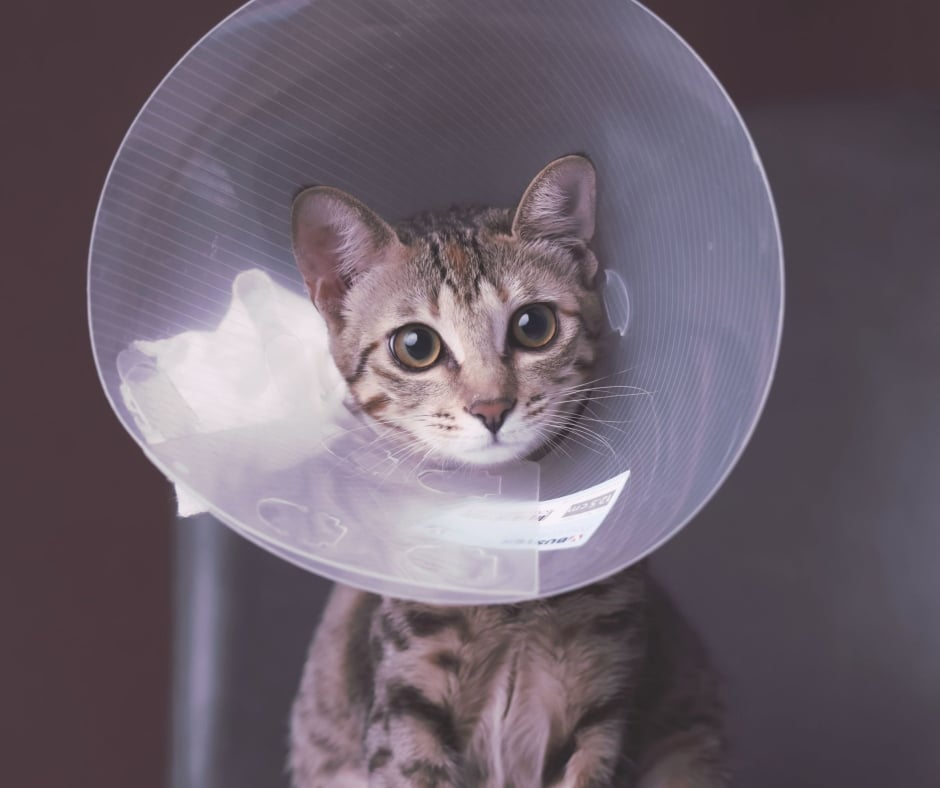Pets often explore the world with their mouths, and they are known to be curious eaters. This can be harmless if the non-food object passes through their system as usual.
However, inedible objects can sometimes become lodged in your pets throat, stomach, or intestines. This can cause serious issues, such as infection, toxicity, illness, or even death.
Though digestive blockage is the most common reason for foreign body removal surgery, there are a few other things which may enter a pet’s body and compromise their well-being. For example, if your pet gets broken glass stuck in their paw, or sharp debris in their eye, a visit to the veterinary hospital may be necessary.
Signs to Look for If You Suspect Foreign Body Ingestion
Depending on the size, location, and duration of the obstruction, symptoms may vary. Generally speaking, some early warning signs may include:
- Vomiting
- Continual gagging, swallowing, or coughing
- Lethargy
- Lack of appetite
- Difficulty defecating or having diarrhea
- Bloated or tender abdomen
- Hiding
- Whining or crying
These symptoms can indicate a digestive blockage caused by a foreign object, or some other unwanted condition. If you notice any of these signs in your pet, call your veterinarian immediately.
Foreign Body Removal Procedures
For less internal foreign bodies, such as the glass in paw injury mentioned above, the vet may be able to remove it with sterile tweezers and minimal discomfort to your pet. For ingested foreign bodies, more thorough treatment will be required.
Your veterinarian will likely examine the pet with an X-ray or other imaging scan.
This helps them locate the size and severity of the obstruction. Bloodwork may also be done in order to determine any potential side effects from the object on their system.
Depending on what the vet finds, there are two main options available to remove a foreign body:
- Endoscopic Retrieval: This is a minimally invasive procedure that is best for objects located in the upper digestive tract, such as the esophagus or stomach. It is ideal because it is faster and requires little recovery other than rest. The pet will be anesthetized before the procedure. Then, the vet will use a small, flexible tool equipped with a camera and grabber. They will insert the endoscope through the mouth and carefully withdraw the object.
- Gastrointestinal Surgery: This is a major and invasive surgery that may be necessary if the object is located in the intestines, or if it cannot be safely removed through the esophagus. The pet will be anesthetized and will need to fast for several hours prior to the surgery. The vet will make small, calculated incisions to the necessary organs in order to remove the foreign object. They will also examine the internal area for any damage caused by the object before suturing the incision.
Post-Operative Care
In cases where your pet needs surgical removal of a foreign body, your vet will discuss any specific care necessary to help them recover.
It’s a good idea to provide them a quiet, calm space away from other pets and sources of excitement. Avoid giving your pet a bath for about 10 days, and check the incision daily to ensure it heals correctly. A cone may be provided to prevent the pet from licking or biting the incision site.

If you notice any of the following during your pet’s recovery, call your veterinarian:
- Redness, swelling, or discharge
- Reopened incision
- Lethargy
- Decreased appetite
- Vomiting or diarrhea
How You Can Help Your Pet
It’s important to note that, as smart as your dog or cat may be, they will not learn their lesson after having a foreign object removed from their system. In fact, if presented with the same enticing snack, they may try to ingest it again.
To help your pet, keep small objects out of their reach. The most commonly ingested objects to be aware of in your home include:
- Bones, pits, or other large seeds (especially from the trash)
- Sticks
- Buttons or beads
- Cloth or string
- Coins
- Pebbles
- Small balls such as marbles
- Socks, underwear, or pantyhose
- Pieces of chew toys
- Hair ties or rubber bands
- Batteries
If your dog is notorious for digging through the trash, or has even figured out how to open cabinets and drawers, you might want to consider child-proof latches in the kitchen to keep them safe.
Foreign Body Diagnosis & Removal for Cats & Dogs in Frederick, MD
If you suspect your pet has ingested something, they will need treatment as fast as possible. Here at Old Farm Veterinary Hospital in Frederick, Maryland, our team of skilled and caring veterinarians is here to help. We have the knowledge, experience, and big hearts needed to diagnose the problem quickly and treat your pet effectively. Call today to schedule an appointment!

